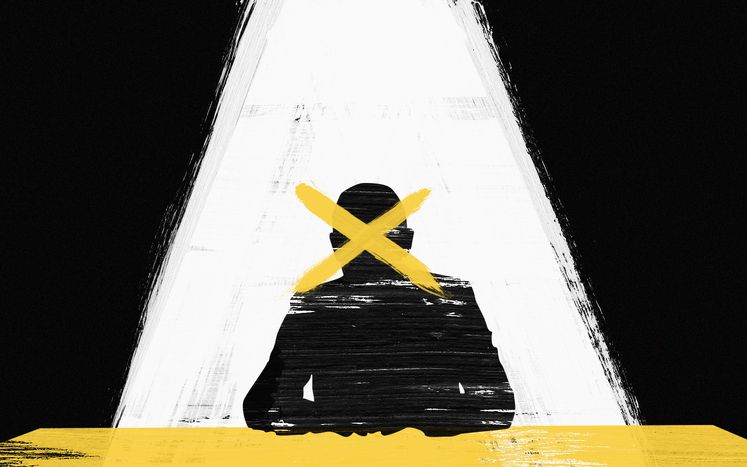
An Exquisite Corpse in the Land of Blackbirds: Chapter Ten
Published on
Translation by:
Ida Sophie WinterIn the early 2000s, was Kosovo the site of organ trafficking, carried out by guerillas on Serbian prisoners? The question is now on everyone’s lips due to the shocking testimony of a former UÇK (KLA) soldier shaking the country. An anonymous voice resounds within a concert played by larger powers.
X - Witness X
“They gave me a scalpel. I placed my left hand on his chest and began cutting. The blood spattered. He began to scream, begging us not to massacre him, not to kill him, and then, he lost consciousness. I don’t know if he escaped or if he died, because I wasn’t in my normal state.”
It’s September 2012. The testimony of a former UÇK (KLA) soldier, face blurred and voice distorted, is broadcast at peak viewing time on Serbia’s main public television channel, shocking the nation. His terrifying story is branded as a major support to the “impartial and independent” war crimes investigation being conducted in Belgrade and the Serbian Public Prosecutor's Office. Besides the pursuit of war criminals, this government-established institution has a special mandate to fight Serbia’s negative image in the Balkans and elsewhere. However, above all, their aim is to satisfy those in Serbia who still doubt the impartiality of the International Criminal Tribunal (ITC). Its chief prosecutor, Vladimir Vukčević, repeatedly wishes to “find and punish those who committed this monstrous crime, kidnapped and killed innocent Serbs to traffic their organs — a true genocide.”
In Belgrade, in an office encumbered by stacks of files, the prosecutor adjunct, Bruno Vekaric, affirms that these services spent six months to verify the credibility of 'Witness X,' a UÇK (KLA) resistance fighter trained in a detention camp in Albania, who “spontaneously” appeared at the Serbian Public Prosecutor's Office, “threatened with death in Kosovo.” Placed in “witness protection” from this point forward, the man remains “at the service of international justice.” He is ready to tell his story to anyone willing to listen. The Serbian press didn’t fail to repeat the terrifying account of Witness X announcing new and spectacular revelations in the organ trafficking affair, a tale quickly passed on to international media. Many have questioned the possible opportunism of choosing the broadcast date.
The testimony aired on September 10, 2012, the day after Kosovo attained full sovereignty with the congratulations of American President Barack Obama. Since Kosovo's unilateral declaration of independence in 2008 and despite the development of political negotiations between the Serbian and Kosovar governments, its independence has continued to divide the international community. Following Tatarstan, Chechnya, Abkhazia, South Ossetia, Transnistria and Nagorno-Karabakh and recently the Ukrainian Crimea, Kosovo wasn’t the first province to claim its independence, more or less unilaterally, provoking the ire of larger powers.
Moscow refuses to recognise Kosovo, the “American creature.” Instead, it directly supports the initiatives of Serbia, specifically the Public Prosecutor for war crimes. Russia doesn’t hesitate to advocate for an international investigation by the United Nations into the issue. “In supporting Serbia’s investigation, Moscow made the troublemakers run circles,” explains Dick Marty. “In the end, nothing happened. In exchange, the United States turned a blind eye to what was happening in Georgia and Chechnya. It was an exchange of courtesies.” Bruno Vekaric deigns to admit “that there is a real political conflict surrounding this crime. Certain leaders in the region, and in the rest of the world, worry that if this comes to light, it will slow the recognition from the international community of Kosovo’s independence.”
His compatriot Nataša Kandić, a tireless Serbian human rights activist, head of the Belgrade Centre for Human Rights, has a completely different opinion. “The War Crimes Bureau in Belgrade never succeeded in accusing the former police and Serbian army chiefs. This is tantamount to emphasising the responsibility of the Serbian state in these crimes, and no one wants to hear about that here,” she explains.
“The Serbian Public Prosecutor often highlights the organ trafficking story, brandishing the Marty report for political purposes,” continues Kandić, staring at me from behind her round eyeglasses. “I don’t doubt that organ trafficking took place. But, Marty only obtained evidence of ten cases,” she criticizes. For her, parading a witness for such a sensitive investigation isn’t normal. According to Kandić, Witness X’s credibility is questionable. “These last years, everything the Bureau has done is to corroborate the Serbian government’s political position vis à vis Kosovo. With the arrival of a new Serbian cabinet following the 2012 presidential elections (Ivica Dačić replaced former Prime Minister Boris Tadic — Ed.), Vukčević didn’t know what awaited him. To ensure his survival, he became excessively zealous.” Nataša Kandić does not mince words: “Publicising Witness X is absolutely not professional. This does nothing but revive the pain of families of the missing. Besides, this informs those who participated in the crime, accomplices of the witness, to know they’re in the crosshairs of justice and to escape.”
YOU JUST READ THE TENTH CHAPTER OF OUR INVESTIGATION INTO ORGAN TRAFFICKING IN KOSOVO. DISCOVER THE NEXT CHAPTER OF THIS GREAT THRILLER EVERY TUESDAY THROUGHOUT THE AUTUMN HERE AT YOUR ONLY EUROPEAN MAGAZINE.

Translated from Cadavre exquis au pays des merles noirs : chapitre 10



